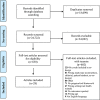Children, young people and parent engagement in health intervention design and implementation: A scoping review
- PMID: 36346148
- PMCID: PMC9854306
- DOI: 10.1111/hex.13572
Children, young people and parent engagement in health intervention design and implementation: A scoping review
Abstract
Introduction: Engaging children and young people (CYP) with and without their parents in health research has the potential to improve the development and implementation of health interventions. However, to our knowledge, the scope of engagement activities used with this population and barriers to their engagement is unknown. The objective of this review was to identify and describe CYP engagement with and without their parents in the development and/or implementation of health interventions.
Methods: This scoping review included any primary research studies reporting on engaging CYP, with or without parents, in the design and/or implementation of health interventions. Healthcare professionals had to be involved over the course of the study and the study had to take place in either community, primary or tertiary care settings. The following databases were searched in May 2017, May 2020 and June 2021: Medline (OVID), CINAHL (EBSCO) and Embase (Elsevier). Two independent reviewers screened titles, abstracts and full-text articles and used a previously piloted extraction form to extract and summarize information from the included articles.
Results: Twenty-eight articles discussing twenty-four studies were included. CYP engagement throughout the research cycle was limited. There were no observed differences in the reported presence of engagement, types of interventions or outcomes of engagement between studies engaging CYP or CYP and parents. Studies engaging CYP and parents contained limited information on how these relationships affected outcomes of engagement. Engagement was enabled primarily by the maintenance of resources and relationships among stakeholders.
Conclusions: Although CYP engagement often influenced health intervention and implementation design, they are inconsistently engaged across the research cycle. It is unclear whether parental involvement enhances CYP engagement. Future research should consider reporting guidelines to clarify the level of CYP and/or parent engagement, and enhance CYP engagement by fostering synergistic and sustainable partnerships with key stakeholders.
Patient or public contribution: A parent partner with codesign experience contributed to the creation of the research questions, screened titles, abstracts and full texts, helped with data extraction and provided feedback on the manuscript.
Keywords: children; engagement; health interventions; parent; young people.
© 2022 The Authors. Health Expectations published by John Wiley & Sons Ltd.
Conflict of interest statement
The authors declare no conflict of interest.
Figures
References
-
- Canadian Institutes of Health Research . Strategy for patient‐oriented research—CIHR. April 1, 2019. Accessed March 19, 2019. http://www.cihr-irsc.gc.ca/e/41204.html
-
- Government of Canada CI of HR . Strategy for patient‐oriented research—patient engagement framework—CIHR. July 2, 2014. Accessed July 8, 2020. https://cihr-irsc.gc.ca/e/48413.html#a4
-
- National Institute for Health Research . NIHR annual report 2015/16: National Institute for Health Research. Accessed March 18, 2019. https://www.nihr.ac.uk/about-us/documents/NIHR-Annual-Report-2015-16.pdf
-
- National Institute of Health Research . INVOLVE | INVOLVE supporting public involvement in NHS, public health and social care research. Accessed March 18, 2019. https://www.invo.org.uk/


